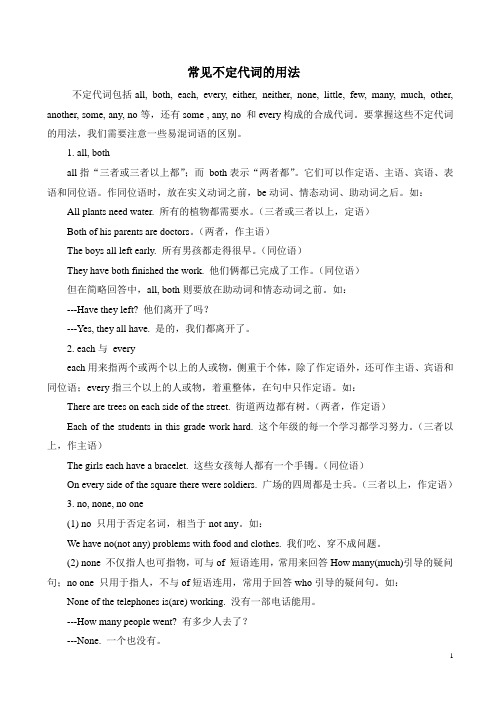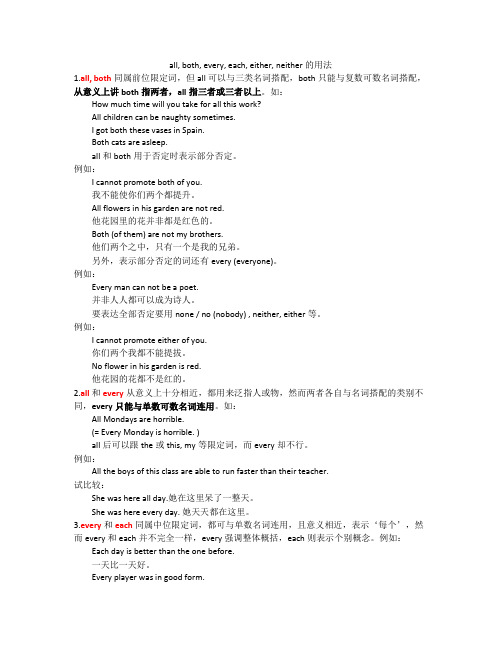both与all的区别
常见不定代词的用法

常见不定代词的用法不定代词包括all, both, each, every, either, neither, none, little, few, many, much, other, another, some, any, no等,还有some , any, no 和every构成的合成代词。
要掌握这些不定代词的用法,我们需要注意一些易混词语的区别。
1. all, bothall指“三者或三者以上都”;而both表示“两者都”。
它们可以作定语、主语、宾语、表语和同位语。
作同位语时,放在实义动词之前,be动词、情态动词、助动词之后。
如:All plants need water. 所有的植物都需要水。
(三者或三者以上,定语)Both of his parents are doctors。
(两者,作主语)The boys all left early. 所有男孩都走得很早。
(同位语)They have both finished the work. 他们俩都已完成了工作。
(同位语)但在简略回答中,all, both则要放在助动词和情态动词之前。
如:---Have they left? 他们离开了吗?---Yes, they all have. 是的,我们都离开了。
2. each与everyeach用来指两个或两个以上的人或物,侧重于个体,除了作定语外,还可作主语、宾语和同位语;every指三个以上的人或物,着重整体,在句中只作定语。
如:There are trees on each side of the street. 街道两边都有树。
(两者,作定语)Each of the students in this grade work hard. 这个年级的每一个学习都学习努力。
(三者以上,作主语)The girls each have a bracelet. 这些女孩每人都有一个手镯。
(同位语)On every side of the square there were soldiers. 广场的四周都是士兵。
all, both, every, each, either, neither的用法

all, both, every, each, either, neither的用法1.all, both同属前位限定词,但all可以与三类名词搭配,both只能与复数可数名词搭配,从意义上讲both指两者,all指三者或三者以上。
如:How much time will you take for all this work?All children can be naughty sometimes.I got both these vases in Spain.Both cats are asleep.all和both用于否定时表示部分否定。
例如:I cannot promote both of you.我不能使你们两个都提升。
All flowers in his garden are not red.他花园里的花并非都是红色的。
Both (of them) are not my brothers.他们两个之中,只有一个是我的兄弟。
另外,表示部分否定的词还有every (everyone)。
例如:Every man can not be a poet.并非人人都可以成为诗人。
要表达全部否定要用none / no (nobody) , neither, either等。
例如:I cannot promote either of you.你们两个我都不能提拔。
No flower in his garden is red.他花园的花都不是红的。
2.all和every从意义上十分相近,都用来泛指人或物,然而两者各自与名词搭配的类别不同,every只能与单数可数名词连用。
如:All Mondays are horrible.(= Every Monday is horrible. )all后可以跟the或this, my等限定词,而every却不行。
例如:All the boys of this class are able to run faster than their teacher.试比较:She was here all day.她在这里呆了一整天。
all和both的用法区别

all和both的用法区别一、什么是"all"和"both"在英语中,我们经常会遇到两个相似的词——"all"和"both"。
虽然它们看起来很相近,但在使用时却有一些细微的差别。
本文将探讨它们的用法区别,并为读者提供几个例句以加深理解。
二、"all"的用法1. 表示全部或整体: "all" 用来表示一个集合或群体中的每个成员或事物,强调没有例外。
例如:- All students must submit their assignments by Friday.(所有学生必须在星期五前提交他们的作业。
)- He ate all the apples in the basket.(他吃光了篮子里的所有苹果。
)2. 表示强调完全性: "all" 也可以用于加强某种程度或数量的意义,表示完全与彻底。
例如:- I'm not at all surprised that she won the competition.(她赢得比赛我一点也不感到惊讶。
)- The party was all fun and laughter.(这个聚会上欢声笑语不断。
)3. 在特定结构中使用:"all" 还可用于特定结构中表达特定意义:a. "all of + 名词复数/不可数名词": 表示整体中的每一个或全部。
- I have read all of the books on the shelf.(我已经阅读了书架上的所有书。
)b. "all that + 句子": 所有的、仅仅是……这一个。
- All that I want is a good book to read.(我想要的只是一本好书。
)c. "all the + 最高级形容词": 着重表示程度最高。
all, both, every, each, either, neither的区别

all, both, every, each, either, neither的区别1.all, both同属前位限定词,但all可以与三类名词搭配,both只能与复数可数名词搭配,从意义上讲both指两者,all指三者或三者以上。
如:How much time will you take for all this work?All children can be naughty sometimes.I got both these vases in Spain.Both cats are asleep.all和both用于否定时表示部分否定。
例如:I cannot promote both of you.我不能使你们两个都提升。
All flowers in his garden are not red.他花园里的花并非都是红色的。
Both (of them) are not my brothers.他们两个之中,只有一个是我的兄弟。
另外,表示部分否定的词还有every (everyone)。
例如:Every man can not be a poet.并非人人都可以成为诗人。
要表达全部否定要用none / no (nobody) , neither, either等。
例如:I cannot promote either of you.你们两个我都不能提拔。
No flower in his garden is red.他花园的花都不是红的。
2.all和every从意义上十分相近,都用来泛指人或物,然而两者各自与名词搭配的类别不同,every只能与单数可数名词连用。
如:All Mondays are horrible.(= Every Monday is horrible. )all后可以跟the或this, my等限定词,而every却不行。
例如:All the boys of this class are able to run faster than their teacher.试比较:She was here all day.她在这里呆了一整天。
bothall的区别和用法

bothall的区别和用法Both和All均为英语中常见的词汇,它们在用法和含义上存在一些区别。
首先,区别之一在于它们的基本含义。
Both表示“两者都”或“两者都是”,强调两个事物或人的并存或共同性质。
例如:1. Both of my parents are doctors.(我父母双方都是医生。
)2. We both agreed to the plan.(我们双方都同意这个计划。
)而All则表示“全体”或“全部”,指的是一个范围内的所有事物或人。
例如:1. All the students passed the test.(所有学生都通过了考试。
)2. She ate all the cookies.(她吃了所有的饼干。
)其次,它们在用法上也存在一些区别。
Both通常用于简单句中,后面直接跟名词或代词作为其宾语,可用于肯定句、否定句和疑问句。
在句中,both常位于句子的主语之前或句子的谓语动词之前。
例如:1. Both of them are my friends.(他们两个都是我的朋友。
)2. I don't like both of them.(我不喜欢他们俩。
)3. Did you see both the movies?(你看了那两部电影吗?)All则可以用于各种复杂句型中,后面也跟名词或代词作为其宾语,可用于肯定句、否定句和疑问句。
在句中,all常位于句子的主语之前、句子的谓语动词之前或句子的宾语之前。
例如:1. All the boys are playing basketball.(所有的男孩子都在打篮球。
)2. I don't like all the cakes.(我不喜欢所有的蛋糕。
)3. Did you eat all the food?(你把所有的食物都吃了吗?)此外,both和all还可以在句中用作形容词或副词。
作为形容词时,both和all通常修饰名词,表示全部或两者的某个特征。
bothall的用法和区别

bothall的用法和区别一、Both和All的基本用法与区别在英语中,both和all都是表示“全部”的词汇,然而它们在使用上存在一些区别。
本文将从语法角度具体解释both和all的用法,并分析它们之间的区别。
1. Both的用法:Both可以用作形容词、代词或连接词,以下是它们各自的用法:- 形容词:作为形容词时,both修饰名词,表达两者全都具备某种特征或性质。
例句:Both children are intelligent.- 代词:当both作为代词时,常放在句子主语位置,并且其后紧跟的名词短语需要有补语或动宾关系。
例句:Both of them speak English fluently.- 连接词:当both作为连接词时,通常连接两个并列成分(如主语、宾语等),表示双方全都满足条件。
例句:He both sings and dances well.2. All的用法:All同样可以用作形容词、代词或连接词,以下是它们各自的用法:- 形容词:作为形容词时,all修饰名词,表示整体具备某种特征。
例句:All students must attend the lecture.- 代词:当all作为代词时,可以指全体人或物,包括主语在内。
例句:All of us are going on a trip.- 连接词:all作为连接词时,通常与both一起使用,表示除两者之外的其他所有人或物。
例句:Both Peter and Mary ate an apple, but all others ate oranges.3. 区别:尽管both和all都表示“全部”,但它们存在一些细微差别:- 范围:Both强调两者全都满足某种条件,而不包括其他人或物;All则强调整体泛指全部人或物。
- 使用位置:Both通常放在句子主语位置,并且其后需要有补语或动宾关系;All可以作形容词、代词和连接词使用,位置较为灵活。
both side与all的区别

both side与all的区别摘要:1.概述both和all的含义2.分析both和all的用法差异3.举例说明both和all在不同语境下的使用4.总结both和all的区别及其适用场景正文:在日常英语学习中,both和all这两个词都表示“全部”或“所有”,但在实际运用中,它们之间存在一定的差别。
下面我们将详细分析这两个词的含义、用法差异以及在不同语境下的使用。
1.概述both和all的含义Both指的是“两者都”,表示范围较小,通常用于指代两个事物。
而all 则表示“全部”,可以用于指代三个或三个以上的事物。
简单来说,both强调的是两个事物都具备某种属性,而all强调的是多个事物中的每一个都具备某种属性。
2.分析both和all的用法差异在用法上,both通常用于表示两个事物之间的共同点,如:“Bot h he and she are talented singers.”(他和她都是才华横溢的歌手。
)而all则用于表示多个事物之间的共同点,如:“All the students in our class are hardworking.”(我们班的所有学生都很勤奋。
)3.举例说明both和all在不同语境下的使用以下是一些具体的例子,以帮助大家更好地理解both和all的区别:- Both of the candidates are well-prepared for the interview.(两位候选人都是为面试做好了充分的准备。
)- All of the guests arrived on time for the party.(所有客人都在派对准时到达。
)在这些例子中,both和all分别表示了不同的对象,且均表达了某种共同特征。
4.总结both和all的区别及其适用场景综上所述,both和all的主要区别在于所指范围的大小。
both用于表示两个事物,而all用于表示三个或三个以上的事物。
both与all的区别

- 1、下载文档前请自行甄别文档内容的完整性,平台不提供额外的编辑、内容补充、找答案等附加服务。
- 2、"仅部分预览"的文档,不可在线预览部分如存在完整性等问题,可反馈申请退款(可完整预览的文档不适用该条件!)。
- 3、如文档侵犯您的权益,请联系客服反馈,我们会尽快为您处理(人工客服工作时间:9:00-18:30)。
ቤተ መጻሕፍቲ ባይዱ
1、你们两个都对。 、你们两个都对。 You are both right. Both of you are right. 2、我有三只铅笔。他们全部都是红色的。 、我有三只铅笔。他们全部都是红色的。 I have three pencils . They are all red. I have three pencils . All of them are red. 3、Lily和Lucy都来自于英国。 、 都来自于英国。 和 都来自于英国 Lily and Lucy are both from England. 4、我们俩都想去。 、我们俩都想去。 We both want to go. Both of us want to go.
both 两者都 all 三者或三者以上 1、与动词连用,放在be动词后,实意动词前。 、与动词连用,放在 动词后 实意动词前。 动词后, 2、当代词讲,both作主语谓语动词用复数 、当代词讲, 作主语谓语动词用复数 例:Both are happy. all作主语 ----指人,谓语动词用复数 作主语 指人, 指人 例:All are here. ----指物,谓语动词用单数 指物, 指物 例:All is right. 3、both和all都可直接修饰名词 、 都可直接修饰名词 和 都可直接修饰 当出现人称代词宾格、 限定词(the / these /those), 当出现人称代词宾格、 限定词 宾格 要用 both of 或 all of .
